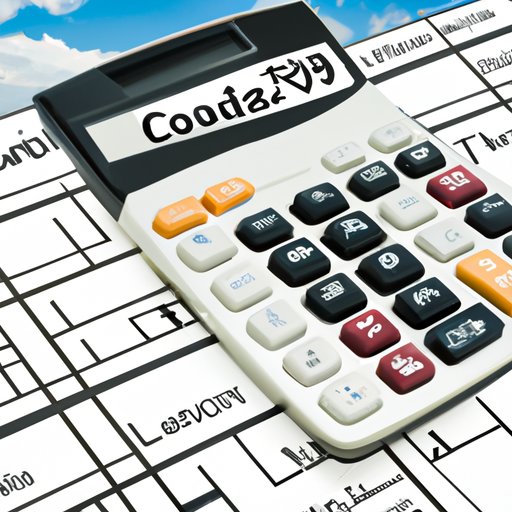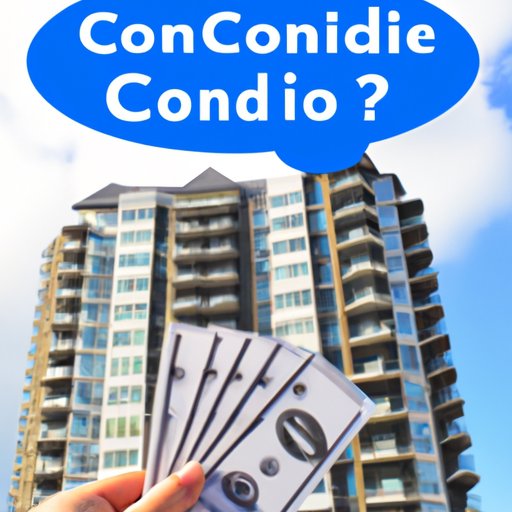Introduction
Buying a condo is a big financial decision. It requires careful consideration of your current finances and future plans. Before you start shopping for a condo, it’s important to determine how much you can afford. This article will provide a comprehensive guide to calculating your maximum condo price range.
Overview of the Problem
Most people have a general idea of what they can afford when it comes to purchasing a home. But determining an exact budget can be difficult. Factors like income, expenses, savings, debt, credit score, and financing all play a role in determining how much you can realistically spend on a condo.
Purpose of the Article
The purpose of this article is to provide a step-by-step guide to help you calculate your maximum condo price range. It will cover topics such as understanding your income and expenses, examining your savings, calculating a maximum price range, assessing your debt-to-income ratio, evaluating your credit score, exploring financing options, and understanding the costs of buying and owning a condo.
Estimating Your Maximum Condo Price Range
Before you start shopping for a condo, it’s important to estimate your maximum price range. This will help ensure that you don’t overspend and end up with a mortgage payment that’s too high for your budget.
Understanding Your Income and Expenses
The first step in calculating your maximum condo price range is to understand your income and expenses. Start by making a list of all your sources of income, including salary, bonuses, investments, and any other sources of income. Next, make a list of all your monthly expenses, such as rent or mortgage payments, utilities, car payments, insurance, groceries, and entertainment.
Once you have your income and expenses listed, subtract your expenses from your income. This will give you an estimate of how much money you have left over each month after paying your bills. According to a survey conducted by the National Association of Realtors, the average American has $1,100 per month left over after paying their bills. 1
Examining Your Savings
The next step is to examine your savings. You should have at least three to six months of living expenses saved in an emergency fund. This will protect you if you experience a job loss or other unexpected financial setback. If you don’t have enough saved, you may need to delay your condo purchase until you have built up a sufficient emergency fund.
Calculating a Maximum Price Range
Once you have an understanding of your income, expenses, and savings, you can calculate a maximum price range for your condo. Start by subtracting your expenses from your income. Then subtract your savings from this amount. The result is the maximum amount you can afford to spend on a condo each month. For example, if you have $1,500 in income each month, $1,000 in expenses, and $500 in savings, your maximum condo price range would be $0.

Calculating Your Financial Readiness for a Condo Purchase
Before you start shopping for a condo, it’s important to assess your financial readiness. This will help ensure that you are able to secure financing and get the best rate possible.
Assessing Your Debt-to-Income Ratio
Your debt-to-income ratio is one of the most important factors in determining your financial readiness for a condo purchase. This ratio compares your total monthly debt payments to your gross monthly income. Lenders use this ratio to determine whether you are able to handle additional debt. Most lenders prefer a ratio of 36% or lower. 2 If your ratio is higher than this, you may need to pay down some of your debt before applying for a loan.
Evaluating Your Credit Score
Your credit score is another important factor in determining your financial readiness for a condo purchase. Your credit score is a number between 300 and 850 that indicates how likely you are to repay a loan. The higher your score, the better rate you will receive from lenders. Most lenders prefer a credit score of 620 or higher. 3 If your score is lower than this, you may need to take steps to improve it before applying for a loan.
Exploring Financing Options
Once you have assessed your debt-to-income ratio and evaluated your credit score, it’s time to explore financing options. There are several types of mortgages available, including fixed-rate, adjustable-rate, and interest-only mortgages. It’s important to compare rates and terms to find the best deal. You may also want to consider government programs such as FHA loans and VA loans, which offer lower down payment requirements and more flexible terms.

Understanding the Costs of Buying and Owning a Condo
It’s important to understand the costs of buying and owning a condo before you start shopping. This will help you get a better idea of how much you can realistically afford.
Closing Costs
Closing costs are the fees associated with obtaining a mortgage and purchasing a condo. These fees typically include appraisal fees, title insurance, and attorney’s fees. Closing costs vary depending on the state and lender, but they typically range from 2 to 5 percent of the purchase price. 4 It’s important to factor these costs into your budget when calculating your maximum condo price range.
Ongoing Maintenance Costs
Owning a condo also involves ongoing maintenance costs. These costs can include repairs, upgrades, landscaping, and association fees. It’s important to research the maintenance costs for the condos you are considering before making a purchase. This will help you avoid any unpleasant surprises down the road.
Property Taxes
Property taxes are another cost to consider when buying a condo. Property taxes vary depending on the state and county, so it’s important to research the property taxes for the condos you are considering. In addition, many states offer tax breaks for homeowners, so it’s important to research your state’s laws to see if you qualify.
Insurance
Finally, it’s important to factor in the cost of insurance when calculating your maximum condo price range. Homeowners insurance is required for most mortgages, and it covers losses due to fire, theft, and other disasters. It’s important to shop around for the best rate and coverage.

Tips for Saving Money to Buy a Condo
If you’re having trouble affording a condo, there are several ways to save money. Here are a few tips to help you save for a condo purchase:
Increase Your Income
The easiest way to increase your budget for a condo is to increase your income. Consider taking on a second job or starting a side hustle. You could also look into getting a raise or bonus at work. Any extra money you make can go toward your condo purchase.
Reduce Your Spending
Another way to save money for a condo purchase is to reduce your spending. Take a close look at your budget and identify areas where you can cut back. You could also look into consolidating your debt or refinancing your existing loans to get a lower interest rate.
Consider Living in a Lower Cost Area
Finally, you may want to consider living in a lower cost area. Housing costs can vary greatly from city to city, so it’s worth researching different areas to find one with lower prices. You may be able to find a condo that fits your budget in a less expensive area.
Conclusion
Buying a condo is a big financial decision. It requires careful consideration of your current finances and future plans. This article provided a comprehensive guide to calculating your maximum condo price range. It covered topics such as understanding your income and expenses, examining your savings, calculating a maximum price range, assessing your debt-to-income ratio, evaluating your credit score, exploring financing options, and understanding the costs of buying and owning a condo. With the right preparation and planning, you can find a condo that fits your budget and lifestyle.
Summary of Key Points
To calculate your maximum condo price range, start by understanding your income and expenses. Subtract your expenses from your income and then subtract your savings. Next, assess your debt-to-income ratio, evaluate your credit score, and explore financing options. Finally, understand the costs of buying and owning a condo, including closing costs, maintenance costs, property taxes, and insurance. With the right preparation and planning, you can find a condo that fits your budget and lifestyle.
Final Thoughts
Buying a condo is a big decision that requires careful consideration of your finances. With the right preparation and planning, you can find a condo that fits your budget and lifestyle. By following the steps outlined in this article, you can confidently determine your maximum condo price range and start shopping for your dream home.
(Note: Is this article not meeting your expectations? Do you have knowledge or insights to share? Unlock new opportunities and expand your reach by joining our authors team. Click Registration to join us and share your expertise with our readers.)
